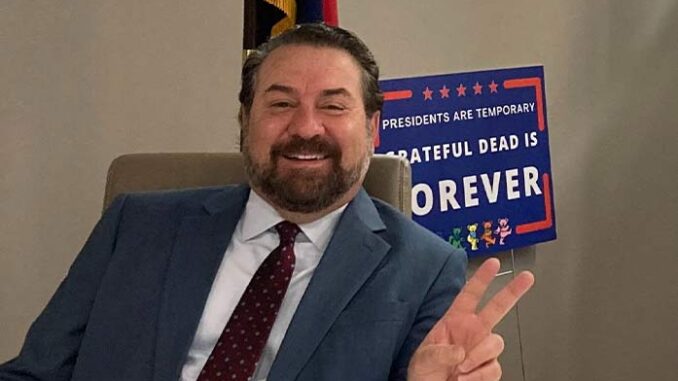
by Matthew Holloway | Jan 14, 2026 | News
By Matthew Holloway |
Republican leaders across Arizona responded to the death of former Arizona Attorney General Mark Brnovich, remembering him as a dedicated public servant who left an imprint on the state’s legal and political landscape.
Brnovich’s family confirmed the 59-year-old’s passing on Tuesday, saying he will be “forever remembered and cherished by us as a beloved father, husband, son, and brother,” according to ABC15. The family asked for privacy as memorial arrangements are finalized.
Senate President Warren Petersen said Arizona lost “a devoted public servant” who defended state laws and the rule of law.
“His commitment to public service was matched by his love for this state and his pride in being an Arizonan,” Petersen said. He added that Brnovich “leaves behind a legacy of principled leadership and a record of service that will not be forgotten.”
In a post to X, Petersen added, “Mark was a devoted husband, father, and an outstanding public servant. Every time I saw him, he graciously thanked me for being one of the first to endorse his AG run. It was an easy decision—he was a strong conservative committed to keeping Arizona safe. Prayers for his wife Susan, their daughters, and the entire family during this incredibly difficult time.”
Senate Majority Leader John Kavanagh said Brnovich understood the attorney general’s job “was not about politics, but about defending the law,” while Senate President Pro Tempore T.J. Shope noted he was a “strong partner to the Legislature” who consistently defended Arizona’s sovereignty.
Senate Majority Whip Frank Carroll said Brnovich served the state “with conviction and courage” and carried out his duties “with integrity.”
The Arizona House Republicans released a statement posted to X, writing:
“The Arizona House Republican Majority mourns the passing of our friend and former Attorney General Mark Brnovich. Mark dedicated his career to defending the rule of law, protecting election integrity, and standing up for Arizona families. As Attorney General, he recovered millions for victims, protected small businesses, and worked tirelessly to make Arizona safer. Mark’s contributions as a public servant, veteran, and father will not be forgotten. We honor his life and extend our prayers and deepest condolences to his wife Susan, his children, and all who loved him.”
Former Arizona Governor Doug Ducey also released a statement praising Brnovich’s passion for the law, his advocacy for victims, and his upbeat, “happy warrior spirit,” which Ducey said were hallmarks of his career in a statement per AZ Family. He added, “It was an honor to campaign with and serve alongside Mark Brnovich. His passion for the law, justice, and victims were hallmarks of his career in public service.”
Brnovich’s predecessor in office, Superintendent of Public Instruction Tom Horne, called him “an outstanding, dedicated public servant and a devoted family man,” noting that political differences did not prevent a lasting friendship in later years.
Brnovich served two terms as Arizona’s 26th Attorney General from 2015 to 2023. During his tenure, he was known for high-profile legal actions and outreach as a state and federal prosecutor.
Memorial service details were not immediately released.
Matthew Holloway is a senior reporter for AZ Free News. Follow him on X for his latest stories, or email tips to Matthew@azfreenews.com.

by Matthew Holloway | Jan 13, 2026 | Economy, News
By Matthew Holloway |
Republican legislative leaders in Arizona introduced a tax conformity plan on last week, aimed at aligning the state’s tax code with recent federal tax reforms. The proposal, outlined in a joint press release from the Arizona State Legislature, estimates roughly $1.1 billion in tax savings for Arizonans over the next three years.
Senate Finance Committee Chairman J.D. Mesnard (R-LD13) and House Ways & Means Committee Chairman Justin Olson (R-LD25) are sponsoring the plan through two bills: SB 1106 and HB 2153.
According to the release, Republican lawmakers say the conformity effort will provide certainty to taxpayers and tax preparers amid the current filing season. They state the proposal would adjust Arizona’s tax code to reflect provisions of the federal tax overhaul known as the “One Big Beautiful Bill.”
The Republican plan would include measures such as increasing the child tax credit and establishing a deduction for childcare expenses. It would also aim to apply the federal tax reforms to Arizona’s individual and business tax structures.
“This is an urgent matter. With tax season underway, tax professionals and families alike need clear guidance now,” Senate President Warren Petersen said. “Until the Legislature acts and the Governor signs this plan into law, there is real confusion about how to handle state tax returns. We’re urging Governor Hobbs to join us in resolving this issue promptly by signing this historic tax cut when it hits her desk.”
House Speaker Steve Montenegro (R-LD29) is quoted in the release, asserting that formal legislative action is needed to resolve confusion created by recent state tax guidance issued by the governor’s office, which he says assumes legislative action has already occurred.
Montenegro explained, “The Governor jumped ahead of the law by issuing state tax guidance this week that assumes legislative action – which hasn’t happened yet – and her recent executive order only deepens confusion. This kind of unilateral overreach undermines the process and leaves families, tax preparers, and businesses stuck in the middle.”
He added, “The Legislature is moving to restore certainty, respect the separation of powers, and make sure Arizonans have clear, lawful guidance.”
The press release states that Republican sponsors contend the plan’s focus is on working families, seniors on fixed incomes, and small businesses, and that it would codify measures such as preventing taxation of tips and overtime pay.
SB 1106 and HB 2153 are set to be debated in the Legislature as the session begins.
Matthew Holloway is a senior reporter for AZ Free News. Follow him on X for his latest stories, or email tips to Matthew@azfreenews.com.

by Matthew Holloway | Jan 12, 2026 | News
By Matthew Holloway |
The Arizona Legislature will return to the State Capitol today, marking the start of the Fifty-Seventh Legislature, Second Regular Session and the beginning of legislative work for 2026.
According to information published by the Arizona Legislature, the opening day will include ceremonies in both chambers of the Capitol, followed by a joint session of the House and Senate later in the afternoon.
Per a legislative announcement released ahead of the session, events will begin at 11:00 a.m. with welcome music in the Capitol courtyard performed by the Eastern Arizona College Marching Band.
The Arizona Senate is scheduled to convene at noon in the Senate Chamber to formally open the Second Regular Session. The program outlined in the legislative release includes gathering music by Trio Fratelli, a call to order by Senate President Warren Petersen (R-LD14), an invocation delivered by Pastor Luke Simmons of Ironwood Church, and the presentation of the colors by the Luke Air Force Base Honor Guard.
The Pledge of Allegiance is scheduled to be led by Senator Priya Sundareshan (D-LD17), followed by the national anthem performed by Trio Fratelli. Petersen is expected to deliver opening remarks before the Senate recesses.
Following the recess, Brian Mueller, president of Grand Canyon University, is scheduled to address lawmakers and guests, according to the same announcement.
At 2:00 p.m., members of the House and Senate are scheduled to convene in the House Chamber for a joint session, during which Democratic Governor Katie Hobbs is expected to deliver the annual State of the State address, outlining her priorities for the year ahead.
Following the joint session, the Senate is scheduled to reconvene to complete remaining Senate business.
In a statement included with the opening-day announcement, Petersen said lawmakers are entering the 2026 session focused on affordability and public safety.
“This session, our top priority is to provide real relief for the people of Arizona,” Petersen said. “Opening day is both a celebration and a call to action. It offers a special opportunity for the legislature to welcome their families and loved ones to the Capitol as we mark the beginning of a new session. As we start our work, our focus is clear: lowering costs, making Arizona affordable, protecting our freedoms, and enhancing community safety. I look forward to commencing this session and delivering results for Arizonans across the state.”
The opening-day ceremonies and the joint session will be livestreamed on the Arizona Legislature’s official website at: https://www.azleg.gov/liveproceedings.
Matthew Holloway is a senior reporter for AZ Free News. Follow him on X for his latest stories, or email tips to Matthew@azfreenews.com.

by Matthew Holloway | Jan 11, 2026 | News
By Matthew Holloway |
A federal judge has allowed key claims to proceed in the civil rights lawsuit filed by Rebekah Massie, a Surprise, Arizona, resident who was arrested after criticizing a city attorney’s salary during a city council meeting.
According to the Foundation for Individual Rights and Expression (FIRE), Judge Roslyn O. Silver of the U.S. District Court for the District of Arizona ruled this week that Massie’s First Amendment, Fourth Amendment, and Arizona Open Meeting Law claims will move forward into discovery. The lawsuit stems from an August 2024 city council meeting in Surprise, where Massie was removed, arrested, and charged with trespassing after criticizing the pay of a government attorney during public comment. She was later taken to a detention center.
FIRE said the city did not challenge Massie’s federal constitutional claims in its motion, allowing those claims to proceed. The judge also permitted Massie’s Open Meeting Law claim to move forward, noting that Arizona law places express limits on how government bodies may regulate public comment during meetings.
Several state law claims were dismissed, according to FIRE, after the court determined they were duplicative of the constitutional claims and barred under Arizona’s notice-of-claim statute.
FIRE attorney Adam Steinbaugh said the organization will continue pursuing the case.
“We’re going to continue to fight not only to vindicate Rebekah’s constitutional rights, but to ensure that all Arizonans are free to speak their minds. All of us have the right to criticize our government without being arrested.”
The ruling marks the latest development in a case that has already prompted changes from the City of Surprise.
In September 2024, the Surprise City Council voted to repeal its policy prohibiting criticism of public officials during meetings following public backlash and the filing of the lawsuit. The following month, a judge dismissed the criminal trespassing charge against Massie, calling the government’s suppression of her speech “objectively outrageous.”
According to FIRE, body-camera footage later released showed a Surprise police officer responding to Massie’s complaint that she had been thrown to the ground during her arrest by saying, “That’s what happens when you’re resisting arrest.”
The civil lawsuit against the City of Surprise and individual officials remains ongoing as the case enters the discovery phase.
Matthew Holloway is a senior reporter for AZ Free News. Follow him on X for his latest stories, or email tips to Matthew@azfreenews.com.

by Matthew Holloway | Jan 9, 2026 | News
By Matthew Holloway |
Scammers are targeting veterans with fraudulent fees to register for the National Veterans Golden Age Games, prompting a Federal Trade Commission warning that the VA-hosted event is, and always has been, free for entrants to compete and caregivers, coaches, and loved ones to watch.
The alert was issued in a December 19th Consumer Notice published on the agency’s website.
In its alert, the FTC said veterans have reported finding websites or social media pages that purport to charge a fee to register for the Golden Age Games. According to the notice, these offers are fraudulent and not affiliated with the U.S. Department of Veterans Affairs. Registration for the Games is handled only through VA.gov using verified veteran credentials.
Local veterans and staff with the Phoenix VA Health Care System have long participated in the National Veterans Golden Age Games, with the system’s adaptive sports clinic helping prepare competitors for the event. In June, VA officials in Phoenix publicly recognized a team of Arizona veterans who won multiple medals at the Games. This local involvement underscores the importance of protecting veterans from bad actors online who charge illegitimate fees for an event that is officially free.
The National Veterans Golden Age Games is organized by the VA’s Veterans Sports Programs to promote health, wellness, and physical activity among older veterans. The FTC notice states the Games are free for veterans, coaches, caregivers, and spectators, and that official registration for the 2026 Games, scheduled for June 27 through July 2 in Tampa, Florida, will open January 28, 2026. Registration is only available through VA.gov using an ID.me account. Any online offer claiming immediate registration or requiring payment is likely a scam.
FTC Consumer Sentinel Network data show that Arizona residents filed more than 54,000 fraud reports in 2024, including thousands from military consumers, resulting in more than $336 million in reported losses statewide. Fraud involving imposter schemes, such as fake government fees or event registrations, was one of the top complaint categories among Arizona consumers.
The FTC recommends registering only through official VA channels and avoiding sharing login information or personal credentials with third-party websites. Veterans and families encountering potential fraud schemes are encouraged to report them through ReportFraud.ftc.gov.
The Arizona Attorney General’s Office also maintains a scam-reporting portal and consumer alerts for veteran-related fraud, directing residents to file complaints through the AG Office’s website or the FTC’s federal system.
Matthew Holloway is a senior reporter for AZ Free News. Follow him on X for his latest stories, or email tips to Matthew@azfreenews.com.





